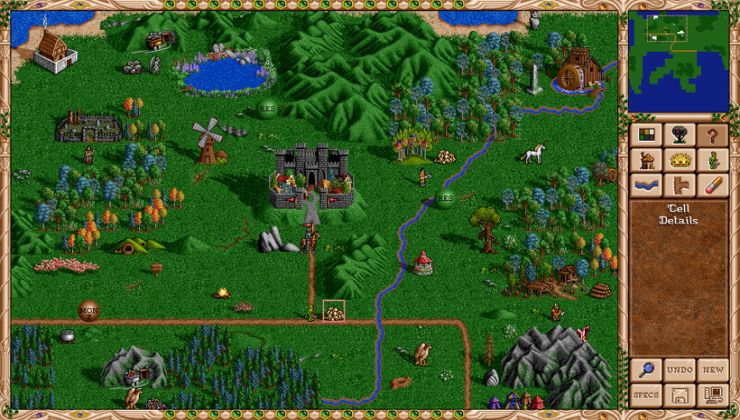Available now for Steam Desktop and Steam Deck, Valve has officially launched the new Steam Families system in a stable Steam Client Update. The system was in Beta since March.
This does not yet bring Steam Game Recording into the stable client, but it does make some UI changes to prepare for it. You'll still need to stay opted into the Beta for all that, but hopefully that will properly ship soon too.
For those who haven't been in the Beta, it finally means your whole Steam Library doesn't get locked down when someone is playing a completely different game. Amongst many other nice improvements like vastly improved parental controls. Overall, a really great update that continues to show why most people prefer Steam.

Direct Link
Here's the full update notes from Valve for Steam Desktop:
General
- Steam Families is now available for all users. For more info about Steam Families, you can read our news post, check out our Support FAQ
- The friends list will now show a Steam Deck icon, instead of a gamepad icon, if the other user is playing on a Steam Deck
- Replaced the friends list VR icon with a new graphic that also matches the in-game or online friend state color
- Improved startup and library performance for users with large libraries
- Improved detection of Nintendo Switch Pro controller
- Improved reliability of "games in common" collections in library
- Rewrite of shortcut key binding in settings UI, including the ability to unbind a hotkey
- Fixed taking HDR screenshots on Windows
- Fixed collections based on friends not updating properly
- Fixed "Soundtracks" and "All Games" shelves on home page applying the app type filter from the top of the games list. This would lead to Soundtracks showing no items if Soundtracks was not selected at the top of the games list, as an example.
- Fixed collection names not being editable.
- Fixed formatting of links in news posts
Screenshots
- Redesigned the screenshots manager
- Added easier ways to share screenshots directly from Steam, including:
- Copy directly to your clipboard
- Send to friend or chat group via Steam chat
- Send to your phone via the Steam Mobile App
- Export as a new file on your computer
- Improved the ability to share multiple screenshots at once by multi-selecting from the grid view
- Improved the performance and reliability of the screenshots manager
- Added the ability to search within the app filter dropdown
- Pre-emptive work to provide future support for recordings and clips to integrate with the screenshots manager when Steam Game Recording releases out of beta
Steam Overlay
- Improved responsiveness of overlay on Windows
- User interface improvements to Steam IME
- New Clock app in the Steam Overlay that can optionally be pinned on top of games.
Steam Input
- Reduced latency of Steam Input API Action Set/Action Set Layer commands. If any input issues are noticed in Steam Input API games please report them in the forums
- Reduced latency of Steam Input API rumble/haptics commands
- Reduce CPU usage when using both Gyro and Joystick or Trackpad for mouse input
- Added Output Icons to all Mode/Behavior dropdown menus. These indicate if the mode (by default) generates OS Mouse output, XInput (controller) Output, Steam Input API Action Output, or is a remapping tool/Overlay Menu (Touch, Radial, Hotbar).
- Steam Input API Analog Actions that can have multiple modes i.e. "Camera | Camera as FlickStick" are now labelled as "... (via FlickStick)"
- Steam Input API Analog Actions can now optionally be used "... (via Gyro To Mouse)" (default is still "As Mouse" or "As Joystick Mouse" depending on source).
- Fixed Steam Input API issue where analog actions from other action sets incorrectly reporting as active. This affected some titles including Okami HD
- Fixed for SIAPI GetMotionData not returning any information on every controller but the first one plugged in
- Fix rare issue where Gyro Processing occurred before controller type is established.
- Fix for Track Pad as Button Behavior not displaying any glyphs.
- Fix "Gyro Calibration" Button appearing twice on Gyro config screen if there is a mode shift applied to the Gyro.
- Fixed a bug where PlayStation controllers connected over BT could be shown as connected over USB
SteamVR
- Fixed a rare crash when launching a game in VR Game Theater
- Fixed a rare crash when launching a VR game for streaming
Linux
- Improved system display scale detection to be compatible with more desktop environments.
- Fixed a crash in gldriverquery when using latest nvidia graphics card drivers
- Fixed a crash that could occur at exit while cleaning up websockets
macOS
- Fixed Disk Write Errors sometimes occurring when updating games on macOS 13+
- Fixed Steam Overlay crash in some games using Metal rendering
- Fixed some UI issues in user login
- Fixed issue preventing the hardware encoder enable setting from being honored
While those changes above cover all platforms from the main changelog, there's also a few changes listed in the Steam Deck changelog that were not present above that seem specific to the Deck:
General
- Added a dropdown to Settings->Display->Advanced to select the maximum resolution allowed to be used by games. This is the global version of the 'Game Resolution' dropdown already available under Game Settings->General.
- Added Sign Out to the power menu on Deck.
- Improvements to keyboard event tracking and audio latency in updated SDL build.
- Improved client startup performance.
- Fixed controller input no longer going to game after resuming from sleep if a wake movie is set.
- Fixed broken thumbnail for screenshots from non-steam game shortcuts uploaded to steam, when viewed from another computer.
- Fixed a case that game server / server browser lists would re-fetch when only re-ping on existing list was requested.
- Fixed some games with achievements showing as "No Achievements" when sorting grids or shelves by achievement percentage.
- Fixed certain apps disappearing from Recent Games after a client restart.
- Fixed collection names being displayed in all uppercase in edit controls.
- Fixed a few spots where tooltips were causing unexpected word wrap.
- Fixed an issue with padding for friends in the game invite dialog.
Desktop Mode
- Fixed Ctrl-F not focusing search box in library.
Clock and Timer
- Improved Timer UI.
Remote Play
- Simplify encoding options to a hardware encoding enable checkbox.
Steam Input
- Fixed for SIAPI GetMotionData not returning any information on every controller but the first one plugged in.
- Fix for Okami HD Brush and Fishing Rod game actions.
- SIAPI: Fix for analog actions from other action sets incorrectly reporting as active. This affected some titles including Okami HD.
- Added "Rotate Output" slider to "Joystick" and "Joystick Mouse" mode settings. This can be useful for certain shmups, or simply to find a more natural "Up" direction on your joystick.
- Fixed regression: "Dots per 360" was having no effect on FlickStick or Gyro to Mouse modes.
- Fixed a case where exiting a non-Steam game could leave controllers w/o input until you hit the guide button or QAM button.
Also see Valve's news post on it.
Quoting: Mountain ManThe simple fact is that family sharing was always intended for use by people living in the same residence, primarily so that parents could share games with their kids. If your sister is living on her own, then the expectation is that she will buy her own games.See the problem is that this isn't true. The new one certainly is primarily so that parents could share games with their kids and is very obvious. But it still fails to cover all families, like Liam's where there are 2 households involved in a kid's life. It's "Houshold Sharing" with a misleading name.
Look, don't get hung up on the name "Family Sharing". Think of it as "local sharing" for a better understanding of the use case.
But for the system we had in place for so long, people claiming, like you, that it was always intended only for close families is, I'm guessing, your assumption. Because Valve themselves wrote in their description about the feature that it's made for sharing with your family, guests and friends. That's why there were restrictions like locking an entire library when one game was open, a limit of 10 devices, and needing a local login for every machine you wanted to authorise. And a lot of us had been using it up to this point like this, you visit someone, login, share your library and can keep 2-3 siblings and 2 really good friends on it for example (specifically my use case). And that's now being taken away, so it's valid criticism that we don't like the change.
I understand of course that the changes made are fantastic for parents with 1-2 little kids living in one home, which is a lot of people, so I get why it was done. I still don't like the changes for myself and others, they are restricting a feature we've known and used for 10 years.
Last edited by Iris Nebula on 13 Sep 2024 at 7:58 am UTC
Quoting: Liam DaweI get that for how some people live, in that way it's a downgrade. But, I don't really believe a family sharing system is meant at all for different countries. That, really, feels like a bit of a stretch for Valve getting developers on board to allow games to be shared like this at all.This... I get that automatic determination what household is based on wifi/ip/gps/whetever is easier but I wouldn't mind providing legal country official document that we are family and Valve would tick off in their system that we are without doing restrictive stuff...
Different households in the same country though, that I feel they could (and should) relax on a bit. Like for me as a co-parent, the kiddo is between two houses in two completely different cities.
I'm moving quite a lot (often for months) abroad and share my library with my nephew (we all live together) and now it just works fine (and I don't play that much so current restrictions don't affect me that much) and with new system I feel it won't work... bollocks!
The playtime control and granular settings for controlling content are also best in class. I have used Microsoft, Google, and Amazon family content sharing and this is way better.
I think most people miss the point of the original library sharing. In my opinion it wasn't meant to share with "relatives" but households. Many people used it to share libraries with friends and family but that wasn't the intention. The people excited about these changes are the intended audience for this feature. Many of the people that are upset seem to be using the feature in a border line exploitive way.
That being said, I have had my kids play with 0 issues while not being in my house. In some cases hundreds of miles from my house. They take their steam decks with them when they visit family or when we go on road trips and vacation. It hasn been a hindrance whatsoever.
Quoting: _wojtekI think suggestions that include non-automated work (a paid human doing something) are nearly always a no-go for a company if they understand economics. There can be edge cases where it provides great value to customers or customers specifically pay for that extra process. But otherwise - yeah, they would more than hesitate when such a suggestion comes up.Quoting: Liam DaweI get that for how some people live, in that way it's a downgrade. But, I don't really believe a family sharing system is meant at all for different countries. That, really, feels like a bit of a stretch for Valve getting developers on board to allow games to be shared like this at all.This... I get that automatic determination what household is based on wifi/ip/gps/whetever is easier but I wouldn't mind providing legal country official document that we are family and Valve would tick off in their system that we are without doing restrictive stuff...
Different households in the same country though, that I feel they could (and should) relax on a bit. Like for me as a co-parent, the kiddo is between two houses in two completely different cities.
I'm moving quite a lot (often for months) abroad and share my library with my nephew (we all live together) and now it just works fine (and I don't play that much so current restrictions don't affect me that much) and with new system I feel it won't work... bollocks!
Quoting: IrisNebulaThe short version is that Valve has finally closed an unintended loophole in the Family Sharing feature.Quoting: Mountain ManThe simple fact is that family sharing was always intended for use by people living in the same residence, primarily so that parents could share games with their kids. If your sister is living on her own, then the expectation is that she will buy her own games.See the problem is that this isn't true. The new one certainly is primarily so that parents could share games with their kids and is very obvious. But it still fails to cover all families, like Liam's where there are 2 households involved in a kid's life. It's "Houshold Sharing" with a misleading name.
Look, don't get hung up on the name "Family Sharing". Think of it as "local sharing" for a better understanding of the use case.
But for the system we had in place for so long, people claiming, like you, that it was always intended only for close families is, I'm guessing, your assumption. Because Valve themselves wrote in their description about the feature that it's made for sharing with your family, guests and friends. That's why there were restrictions like locking an entire library when one game was open, a limit of 10 devices, and needing a local login for every machine you wanted to authorise. And a lot of us had been using it up to this point like this, you visit someone, login, share your library and can keep 2-3 siblings and 2 really good friends on it for example (specifically my use case). And that's now being taken away, so it's valid criticism that we don't like the change.
I understand of course that the changes made are fantastic for parents with 1-2 little kids living in one home, which is a lot of people, so I get why it was done. I still don't like the changes for myself and others, they are restricting a feature we've known and used for 10 years.
Quoting: Mountain ManThe short version is that Valve has finally closed an unintended loophole in the Family Sharing feature.It is closing it, but all I'm saying is that it was very much intended, not unintended.
Steam was ~10 years old when Family Sharing was introduced (and PC gaming in general hadn't been more than a niche until another 10 years before that) and lots of gamers had siblings and friends to share games with, nephews at best, so that's exactly who Valve targeted with that feature.
Now Steam is ~20 years old, their playerbase demographic grew older and has little kids now, so they changed it. Good for them, but 100% intentional.
Seriously, picture 2013 in your mind. Remember, smartphones almost new, burgers cheap, Game of Thrones still in 3rd Season. How many people did you know that were both Steam Gamers and parents? I knew none. Compare that with how many you know now :smile:
Last edited by Iris Nebula on 14 Sep 2024 at 12:41 pm UTC
Quoting: IrisNebulaI don't know how old you are, but parents with kids have been playing video games for decades.Quoting: Mountain ManThe short version is that Valve has finally closed an unintended loophole in the Family Sharing feature.It is closing it, but all I'm saying is that it was very much intended, not unintended.
Steam was ~10 years old when Family Sharing was introduced (and PC gaming in general hadn't been more than a niche until another 10 years before that) and lots of gamers had siblings and friends to share games with, nephews at best, so that's exactly who Valve targeted with that feature.
Now Steam is ~20 years old, their playerbase demographic grew older and has little kids now, so they changed it. Good for them, but 100% intentional.
Seriously, picture 2013 in your mind. Remember, smartphones almost new, burgers cheap, Game of Thrones still in 3rd Season. How many people did you know that were both Steam Gamers and parents? I knew none. Compare that with how many you know now :smile:
I primarily used family sharing in the past between my spouse and I when we had to travel for work.
I guess it's more parent to child, but only if they are in the same physical location sharing?
I guess I'm failing to see relevant use cases. If one has enough money for everyone in the same house to have their own rig, surely they can afford an extra copy of a game for their kids? If it's a more "Shareware" type of idea where they can try the game to see if they like it, well they can just do that on a parent's account.
On top of that, the 1-year cool down seems oddly long. Just thinking of things like separations, children moving out and getting married (new family), co-parenting, studying abroad, etc.
Quoting: Mountain ManI don't know how old you are, but parents with kids have been playing video games for decades.Closing my 4th decade. I know they have been. They were few exceptions compared to now. Gaming wasn't normalised as it is now, and adults gaming were often mocked and seen as immature. It took people that had video games available at home as kids growing up and becoming adults themselves for this to (partly) go away, and this has only recently happened.
Anyway, this isn't even an argument about the intended purpose of Valve's Family sharing anymore, and I recognise we might have different experiences with you living in the US and me in Southern Europe, with video games being introduced en-mass on different timescales, so I'll just leave it at that it's fine if we disagree :smile:
Last edited by Iris Nebula on 14 Sep 2024 at 9:22 pm UTC
Quoting: chrI think suggestions that include non-automated work (a paid human doing something) are nearly always a no-go for a company if they understand economics. There can be edge cases where it provides great value to customers or customers specifically pay for that extra process. But otherwise - yeah, they would more than hesitate when such a suggestion comes up.Yeah, that's true... Though maybe relying on government ID (but those hardly provide "family ties" info :( )
Quoting: _wojtekI did the automated government ID thing in Japan recently for dating apps (mandated by law) and it was a realllllly poor experience from big companies in a big market. So, not cheap or not good - at least for now.Quoting: chrI think suggestions that include non-automated work (a paid human doing something) are nearly always a no-go for a company if they understand economics. There can be edge cases where it provides great value to customers or customers specifically pay for that extra process. But otherwise - yeah, they would more than hesitate when such a suggestion comes up.Yeah, that's true... Though maybe relying on government ID (but those hardly provide "family ties" info :( )










 How to setup OpenMW for modern Morrowind on Linux / SteamOS and Steam Deck
How to setup OpenMW for modern Morrowind on Linux / SteamOS and Steam Deck How to install Hollow Knight: Silksong mods on Linux, SteamOS and Steam Deck
How to install Hollow Knight: Silksong mods on Linux, SteamOS and Steam Deck